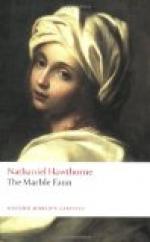“Yes; its exterior is visible far and wide,” said Kenyon. “But such a gray, moss-grown tower as this, however valuable as an object of scenery, will certainly be quite as interesting inside as out. It cannot be less than six hundred years old; the foundations and lower story are much older than that, I should judge; and traditions probably cling to the walls within quite as plentifully as the gray and yellow lichens cluster on its face without.”
“No doubt,” replied Donatello,—“but I know little of such things, and never could comprehend the interest which some of you Forestieri take in them. A year or two ago an English signore, with a venerable white beard—they say he was a magician, too—came hither from as far off as Florence, just to see my tower.”
“Ah, I have seen him at Florence,” observed Kenyon. “He is a necromancer, as you say, and dwells in an old mansion of the Knights Templars, close by the Ponte Vecchio, with a great many ghostly books, pictures, and antiquities, to make the house gloomy, and one bright-eyed little girl, to keep it cheerful!”
“I know him only by his white beard,” said Donatello; “but he could have told you a great deal about the tower, and the sieges which it has stood, and the prisoners who have been confined in it. And he gathered up all the traditions of the Monte Beni family, and, among the rest, the sad one which I told you at the fountain the other day. He had known mighty poets, he said, in his earlier life; and the most illustrious of them would have rejoiced to preserve such a legend in immortal rhyme,—especially if he could have had some of our wine of Sunshine to help out his inspiration!”
“Any man might be a poet, as well as Byron, with such wine and such a theme,” rejoined the sculptor. “But shall we climb your tower The thunder-storm gathering yonder among the hills will be a spectacle worth witnessing.”
“Come, then,” said the Count, adding, with a sigh, “it has a weary staircase, and dismal chambers, and it is very lonesome at the summit!”
“Like a man’s life, when he has climbed to eminence,” remarked the sculptor; “or, let us rather say, with its difficult steps, and the dark prison cells you speak of, your tower resembles the spiritual experience of many a sinful soul, which, nevertheless, may struggle upward into the pure air and light of Heaven at last!”
Donatello sighed again, and led the way up into the tower.
Mounting the broad staircase that ascended from the entrance hall, they traversed the great wilderness of a house, through some obscure passages, and came to a low, ancient doorway. It admitted them to a narrow turret stair which zigzagged upward, lighted in its progress by loopholes and iron-barred windows. Reaching the top of the first flight, the Count threw open a door of worm-eaten oak, and disclosed a chamber that occupied the whole area of the tower. It was most pitiably forlorn of aspect, with a brick-paved floor, bare holes through the massive walls, grated with iron, instead of windows, and for furniture an old stool, which increased the dreariness of the place tenfold, by suggesting an idea of its having once been tenanted.




